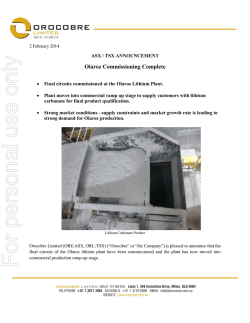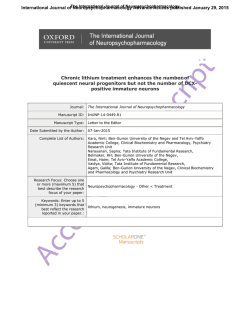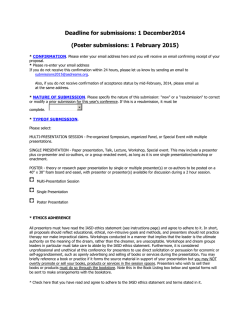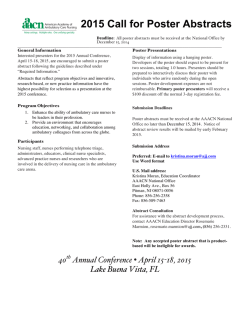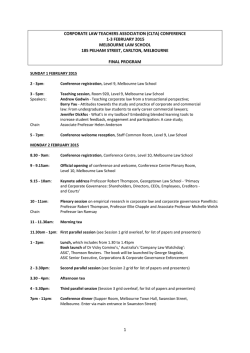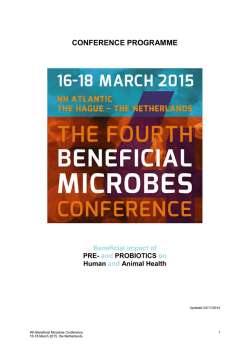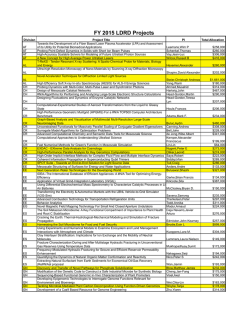
View the Pre-Conference Workshop Session Descriptions
2015 Integrative Healthcare Symposium Pre-Conference Workshop: Clinician’s Tool Box: New Evidence-Based Treatment Protocols to Use in your Practice Tomorrow Session Descriptions and Learning Objectives Wednesday, February 18, 2015 8:30am-10:15am The Evidence for Dietary Bioactives in Clinical Practice: Overcoming the Problem of Proof Dr. Blumberg will provide insights on the often-debated practice of recommending whole foods vs. supplements for meeting your patients’ health needs. He will address the limitations of randomized clinical trials as the ‘gold standard’ in nutrition research while dissecting the concepts of evidencebased practice vs. practice-based evidence. Dr. Blumberg will discuss the totality of evidence in support of micronutrients and bioactives in clinical practice and will describe the current efforts to establish daily reference values for dietary bioactives and its potential impact on educating patients about nutrition. Presenter: Jeffrey B. Blumberg PhD, FASN, FACN, CNS 10:45am-12:30pm Low Dose Lithium for Mood, Behavior and Cognitive Function Lithium has been widely prescribed and researched as a mood-stabilizing drug, yet it continues to be one of the most misunderstood therapies in medicine. What many have ignored is that lithium is not solely a synthetic chemical or pharmaceutical concoction; it is a mineral that is essential to human health. Present in trace amounts in the foods we eat and the water we drink, lithium is a critical nutrient for many aspects of human physiology. Dr. Greenblatt will explore the exciting and promising new research that dietary changes and supplementation with low-dose nutritional lithium may improve human health and contribute to longevity, promote cognitive function, balance mood and aid in managing behavioral challenges. Presenter: James Greenblatt, MD 1:30pm-3:00pm The Neuroendocrine Basis to Effective Weight Loss: The HPA Axis-Stress Connection Chronic stress, obesity and metabolic syndrome are the largest threats to our health this century. We have Fred Flintstone physiology but live in a George Jetson world. This lecture will explain how chronic stress and loss of negative feedback within the HPA axis alters brain function and manipulates gene expression, ultimately resulting in increased lipogenesis, slowed metabolic pathways and abnormal communication between hunger and satiety centers. The key to effective treatment has more to do with supporting optimal brain function and restoring HPA feedback than changing diet. This lecture will describe how to restore neuroendocrine balance through natural therapies including supplementation, diet (food type and timing of meals) and lifestyle modification. Presenter: Penny Kendall-Reed, ND 3:15pm-5:00pm The Potential of Probiotics in Human Health: A Critical Evaluation From Infant Immunity to Age-associated Cognitive Decline Recognizing the profound impact of the microbiome on our physiology presents an opportunity to explore how pre- and probiotics influence our immune, endocrine and neural systems, as well as the well-established benefits for intestinal function based on population dynamics. Dr. Plummer will present the hard evidence supporting the potential benefits of probiotics ranging from skin and immune health to cognitive function, as well as more indirect global health concerns such as antibiotic resistance. The effectiveness of probiotics in modifying the microbiome across different ages and patient populations, the positive effects observed across a broad range of health outcomes and the future of probiotics as supplemental or pharmaceutical interventions will be discussed. Presenter: Nigel Plummer, PhD
© Copyright 2026
